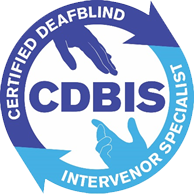Certified Deafblind Intervenor Specialist (CDBIS™)
Certified Deafblind Intervenor Specialists (“CDBIS”) are highly trained professionals who work with individuals who are deafblind and those identified as having a dual sensory loss.
Intervenors are narrators, informers, guides, communicators, and generally a link to the world for someone who is deafblind. They act as a "bridge not a barrier" and subscribe to the philosophy "Do with NOT for".
An intervenor facilitates the interaction of the person who is deafblind with other people and the environment. The intervenor takes direction from the individual who is deafblind and provides information about the environment and what is happening (using receptive language), assists the individual who is deafblind to communicate (using expressive language), provides or develops concepts where necessary, confirms actions, assists with life skills and most importantly, assists the individual to achieve as much independence as possible within their situation.
The sector that they serve is comprised of people who are deafblind or living with dual sensory loss. CDBIS's are experts in providing auditory, visual, and tactile information to someone who is deafblind. In doing so, CDBIS provide access to information and afford opportunities for inclusion, skill development, empowerment, and independence.
The certification, has as its foundation, the several years of work created by agencies within the Province of Ontario, Canada in collaboration with the provincial government in the development of competencies for intervenors as part of the Intervenor Services Human Resources Strategy (ISHRS). The goal of that work was to establish quality standards of practice for intervenors and certification is the natural next step that will allow intervenors to demonstrate to employers and consumers that they have met those standards. The deafblind community was widely consulted in the development of the foundational standards in Ontario during the ISHRS initiative and individuals who are deafblind were also consulted on the Certification Criteria. [ For additional information on the development process please consult the Preface section of the Handbook that can be downloaded below.]
CDBIS are committed to a strong Code of Ethics that used, as its foundation, the Intervenor Organization of Ontario's Intervenor Code of Ethics and Guidelines for Ethical Conduct that stems from the belief that "all individuals who are deafblind have the right to fully access all information / communication clearly and without bias. This includes the right to participate successfully in their community by accessing qualified intervenors that uphold the highest standards of professional integrity, competence, and ethics".
Members of the ACVREP Subject Matter Expert Committee developing this certification participated on the Deafblind Network of Ontario, Intervenor Human Resource Strategies committee and the Intervenor Organization of Ontario's Code of Ethics committee. ACVREP and the Subject Matter Expert Committee wish to express thanks and to acknowledge both organizations for the important contribution their work has made in laying a foundation for the development of the Body of Knowledge, the Applied Competencies and the Code of Ethics for this certification.
While this certification has been developed by the CDBIS Subject Matter Expert Committee based on foundational quality standards developed in the Province of Ontario, Canada, it is open to any intervenor that meets one of the categories of Eligibility and passes the rigorous certification exam.
CDBIS Certification Handbook
 Click here to download the CDBIS Certification Handbook in Microsoft Word format
Click here to download the CDBIS Certification Handbook in Microsoft Word format
